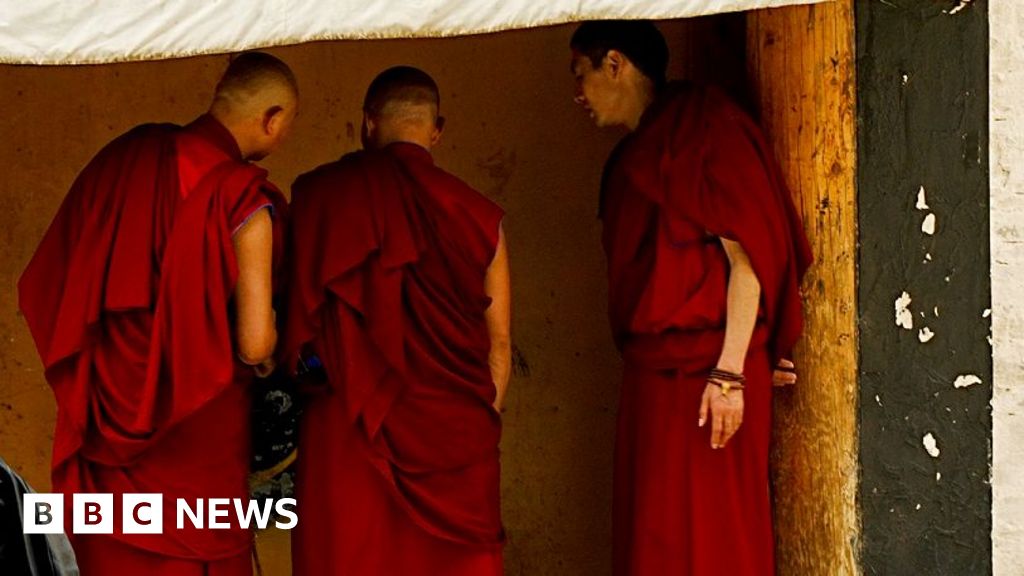
“Be careful, they are watching you.” These words resonate through the corridors of the Kirti monastery in Aba, Sichuan province, as the Dalai Lama turns 90. The BBC’s visit to this historic site, a symbol of Tibetan resistance, reveals a region under tight surveillance. The monastery, known for its defiance against Chinese rule, remains a focal point of tension.
As a monk, cloaked in traditional crimson robes, cautiously approaches, he whispers, “Things here are not good for us.” His words are fraught with risk, as eight unidentified men shadow the BBC team. The presence of a police station at the monastery’s entrance and surveillance cameras perched on steel poles underscore Beijing’s vigilance. “They do not have a good heart; everyone can see it,” the monk adds before warning, “Be careful, people are watching you.”
The Historical Struggle for Tibetan Autonomy
The Communist Party of China has governed Tibet since it annexed the region in 1950, ruling over more than six million Tibetans. Despite significant investments in infrastructure, such as new roads and railways, to integrate Tibet with the rest of China, many Tibetans feel their faith and freedoms are being eroded. Beijing considers Tibet an integral part of China, labeling the Dalai Lama a separatist. Displaying his image or supporting him publicly can lead to imprisonment.
Aba, or Ngaba in Tibetan, is situated outside the Tibet Autonomous Region (TAR) but remains a critical part of the Tibetan homeland. The town has been a hotbed of resistance, notably during the 2008 uprising, which saw violent clashes with Chinese paramilitary forces. According to Tibetan groups in exile, over 150 self-immolations have occurred in and around Aba, demanding the Dalai Lama’s return.
Surveillance and Control in Tibetan Monasteries
Returning to the Kirti monastery before dawn, the BBC team witnesses morning prayers, where monks in yellow hats chant sonorously. Despite the serene setting, the atmosphere is tense. “The Chinese government has poisoned the air in Tibet. It is not a good government,” another monk confides. “We Tibetans are denied basic human rights.” His words, though brief, are a rare glimpse into the suppressed voices within Tibet.
The Dalai Lama’s 90th birthday has sparked reactions worldwide, yet in Tibet, even mentioning his name is forbidden. Beijing has declared that the next Dalai Lama will be chosen in China and approved by the Communist Party, a stance that silences Tibetan voices.
Education and Cultural Erosion
The road to Aba, winding from Chengdu, showcases Beijing’s investments in the region, including a new high-speed railway. However, the imposition of Chinese language education in Tibetan areas has raised concerns about cultural erosion. Under-18s must attend state-run schools, learning Mandarin and delaying Buddhist studies until adulthood. “One of the nearby Buddhist institutions was torn down by the government a few months ago,” a monk laments, highlighting the impact of these policies.
“We are moving to a scenario of the Chinese leader Xi Jinping having total control – towards an era of little information getting into Tibet, little Tibetan language being shared,” notes renowned scholar Robert Barnett.
The Future of Tibetan Leadership
The Dalai Lama’s recent announcement about his succession plan, made from his exile in India, was censored in China. While he advocates for more autonomy rather than independence, Beijing insists he has no right to represent Tibetans. The Dalai Lama’s suggestion that his successor will be from “the free world” sets the stage for a confrontation with Beijing, which demands adherence to national laws in the selection process.
Beijing’s propaganda efforts aim to shape Tibetan perceptions of the next Dalai Lama. The disappearance of the Panchen Lama, identified by the Dalai Lama, and the subsequent appointment of a Beijing-approved successor, exemplify the complexities of Tibetan spiritual leadership under Chinese control.
“Beijing wants to turn the lion of Tibetan culture into a poodle,” Barnett asserts, emphasizing the Party’s desire to reshape Tibetan identity.
As Tibet remains silent on the Dalai Lama’s 90th birthday, the region’s future hangs in the balance. The struggle between preserving cultural heritage and adhering to Beijing’s demands continues under the watchful eyes of surveillance cameras and Party officials.





